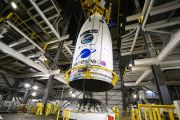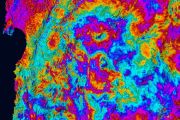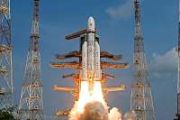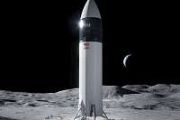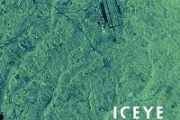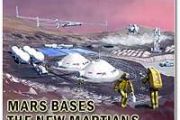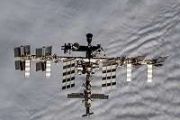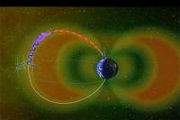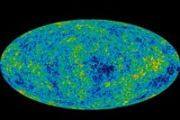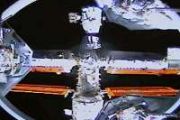
Copernical Team
Space Blocs: The future of international cooperation in space
 Even during times of conflict on the ground, space has historically been an arena of collaboration among nations. But trends in the past decade suggest that the nature of cooperation in space is shifting, and fallout from Russia's invasion of Ukraine has highlighted these changes.
I'm an international relations scholar who studies power distributions in space - who the main players are, wh
Even during times of conflict on the ground, space has historically been an arena of collaboration among nations. But trends in the past decade suggest that the nature of cooperation in space is shifting, and fallout from Russia's invasion of Ukraine has highlighted these changes.
I'm an international relations scholar who studies power distributions in space - who the main players are, wh China mulls building defense system against near-Earth asteroids
 China is set to build monitoring and defense systems protecting the planet from the dangers of near-Earth asteroids (NEAs).
Wu Yanhua, deputy director of the China National Space Administration (CNSA), told China's CCTV News recently that China will start to build an Earth-based and space-based NEA monitoring and warning system, in order to ensure the safe, stable and orderly operation of
China is set to build monitoring and defense systems protecting the planet from the dangers of near-Earth asteroids (NEAs).
Wu Yanhua, deputy director of the China National Space Administration (CNSA), told China's CCTV News recently that China will start to build an Earth-based and space-based NEA monitoring and warning system, in order to ensure the safe, stable and orderly operation of China developing defense against near-Earth asteroids
 China has begun to develop a defense system against near-Earth asteroids that could potentially hit Earth, according to a key figure in the country's space industry.
Wu Yanhua, deputy director of the China National Space Administration, said on Friday that China has started forming a research and development system for defense against near-Earth asteroids, to improve the world's capability
China has begun to develop a defense system against near-Earth asteroids that could potentially hit Earth, according to a key figure in the country's space industry.
Wu Yanhua, deputy director of the China National Space Administration, said on Friday that China has started forming a research and development system for defense against near-Earth asteroids, to improve the world's capability China starts engineering development of lunar exploration program's fourth phase
 China will start engineering development of the fourth phase of its lunar exploration program this year, according to a senior official of the China National Space Administration on Sunday.
The Chang'e 6, Chang'e 7 and Chang'e-8 lunar probes will be launched successively, and the country will endeavor to make breakthroughs in key technologies and build an international lunar research stati
China will start engineering development of the fourth phase of its lunar exploration program this year, according to a senior official of the China National Space Administration on Sunday.
The Chang'e 6, Chang'e 7 and Chang'e-8 lunar probes will be launched successively, and the country will endeavor to make breakthroughs in key technologies and build an international lunar research stati China looking at sending robotic probe to far side of moon
 Chinese scientists and engineers are considering sending a robotic probe to collect dust and rocks from the far side of the moon, an ambitious endeavor that will likely make it a world's first, said a senior space agency official.
Wu Yanhua, deputy director of the China National Space Administration, said on Friday that the United States, Russia and China have brought lunar substances back
Chinese scientists and engineers are considering sending a robotic probe to collect dust and rocks from the far side of the moon, an ambitious endeavor that will likely make it a world's first, said a senior space agency official.
Wu Yanhua, deputy director of the China National Space Administration, said on Friday that the United States, Russia and China have brought lunar substances back New geological research shows Mars may have been more habitable than we thought
 New research by Dr. Steve Grasby, Research Scientist at Natural Resource Canada's Geological Survey of Canada, could indicate a more habitable environment than previously thought for the red planet, Mars.
Located on the northernmost point of mainland Northwest Territories, Canada, the Smoking Hills (Inuvialuit name "Ingniryuat") are a unique geological formation. Named after the smoke crea
New research by Dr. Steve Grasby, Research Scientist at Natural Resource Canada's Geological Survey of Canada, could indicate a more habitable environment than previously thought for the red planet, Mars.
Located on the northernmost point of mainland Northwest Territories, Canada, the Smoking Hills (Inuvialuit name "Ingniryuat") are a unique geological formation. Named after the smoke crea Meteorites from the red desert of Australia support search for life on the red planet Mars
 Monash University, University of Queensland and Australian National University researchers have used ANSTO's Australian Synchrotron in their study of meteorites found on Earth that could be used in future to find evidence of life on the planet Mars.
The examination of meteorites recovered from the Nullarbor Plain in western South Australia by a joint team that included Dr Andrew Langendam
Monash University, University of Queensland and Australian National University researchers have used ANSTO's Australian Synchrotron in their study of meteorites found on Earth that could be used in future to find evidence of life on the planet Mars.
The examination of meteorites recovered from the Nullarbor Plain in western South Australia by a joint team that included Dr Andrew Langendam Mars may have less water than previously estimated
 Researchers from the Oden Institute and Jackson School of Geosciences have developed an improved model for planet-wide groundwater flow prediction on Mars that is not only more accurate but, according to its author, more elegant too.
Mars is believed to have collided with a huge astral entity around four billion years ago.
The Late Heavy Bombardment refers to a period where it is bel
Researchers from the Oden Institute and Jackson School of Geosciences have developed an improved model for planet-wide groundwater flow prediction on Mars that is not only more accurate but, according to its author, more elegant too.
Mars is believed to have collided with a huge astral entity around four billion years ago.
The Late Heavy Bombardment refers to a period where it is bel Future of Earth's defense is ground-based planetary radar
 Powerful radar systems have played a major role in the study of planets, moons, asteroids, and other objects in our Solar System for several decades, and now have a "unique role" to play in planetary defense - "providing protection to the nations of the world from devastating asteroid and comet impacts," according to the newly released Planetary Science and Astrobiology Decadal Survey 2023-2032.
Powerful radar systems have played a major role in the study of planets, moons, asteroids, and other objects in our Solar System for several decades, and now have a "unique role" to play in planetary defense - "providing protection to the nations of the world from devastating asteroid and comet impacts," according to the newly released Planetary Science and Astrobiology Decadal Survey 2023-2032. Two largest Marsquakes to date recorded from planet's far side
 The seismometer placed on Mars by NASA's InSight lander has recorded its two largest seismic events to date: a magnitude 4.2 and a magnitude 4.1 marsquake. The pair are the first recorded events to occur on the planet's far side from the lander and are five times stronger than the previous largest event recorded.
Seismic wave data from the events could help researchers learn more about the
The seismometer placed on Mars by NASA's InSight lander has recorded its two largest seismic events to date: a magnitude 4.2 and a magnitude 4.1 marsquake. The pair are the first recorded events to occur on the planet's far side from the lander and are five times stronger than the previous largest event recorded.
Seismic wave data from the events could help researchers learn more about the 

